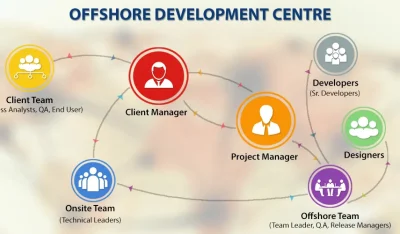- Home
- >
- Offshore News
- >
- Managing Software Development Teams Like a Pro
1. Common challenges in managing Software Development Teams
1.1 Hard to Find Talents
1.2 Insufficient Resources
A big challenge in managing software development teams is not having enough resources. For a team to launch great products on time, it’s important to have the right number of developers who are really good at what they do, along with the tools and setup they need to succeed.
But often, organizations don’t have everything they need. This can lead to team members being either too stretched or not used enough. Following software development team management best practices includes ensuring teams have what they need to work efficiently, but this isn’t always easy due to limited resources.
1.3 Difficulty in Balancing Workload and Expectations

1.4 Poor Coordination Among Team Members
1.5 Unclear Project Requirements
A major hurdle in team management in software development is dealing with unclear project requirements. If the leaders, including managers and directors, don’t clearly communicate their needs and goals to the software development team, ensuring the precise development of required features becomes difficult. This lack of clarity can lead to projects stretching beyond their allocated time and budget.
Effective management requires that every individual on the team understands their part in the project. Utilizing project management tools can aid in delineating tasks and responsibilities, helping to manage software development more efficiently and keep the project on track toward its intended end.
1.6 Poor Leadership
1.7 Lack of Motivation
2. Strategies for Managing Software Development Teams with Ease & Efficiency
2.1 Communicate Effectively
Good communication is key in managing software development teams. It makes work smoother and helps avoid misunderstandings. Teams should meet regularly to share concerns and look for ways to work better together. Having open talks helps everyone feel part of the group and can make work more enjoyable.
It’s important to listen to each other and be clear about project goals and issues. Using tools like chat apps and video calls can also make staying in touch easier, especially for remote teams. By talking openly and often, teams can solve problems quickly and keep projects moving forward.

2.2 Set Clear Goals and Objectives
For software development teams to work well, everyone needs to know the team’s goals. Clear goals mean everyone understands what they need to do. This clarity cuts down on confusion and helps work go smoothly.
It’s very important to spell out each person’s role and what they’re responsible for. When everyone knows their part in the project, there’s no confusion. For instance, if your software development team has five members, make sure each person knows their specific tasks and contributions. This way, work is organized, and the team can move forward efficiently.
2.3 Train Your Developers
Training not only sharpens a developer’s skills but also increases productivity. A technical team can be trained on new technologies to ensure they work efficiently with each other. The company must set aside funds to train various software development team members such as developers, programmers, project managers, etc. Each developer’s skills should be sharpened to ensure they are familiar with the new technologies.
2.4 Set Reasonable KPIs
When managing software development teams, setting reasonable Key Performance Indicators (KPIs) is crucial. KPIs are like milestones that help you measure how well your team is doing. But it’s important to make sure these goals are achievable. If KPIs are too hard, team members might feel overwhelmed. On the other hand, if they’re too easy, the team won’t be challenged enough.
Find a balance by choosing KPIs that are just right for your team’s skill level and project timeline. This way, everyone knows what success looks like and can work together to reach it. Setting achievable KPIs keeps the team motivated and on track.
2.5 Create a Supportive & Productive Team Environment
A supportive environment allows them to unleash their creative potential. It also produces an atmosphere of teamwork where developers share ideas and knowledge. An efficient workflow for software development is all about creating a supportive team environment. When people feel they have the support of their teammates, they are more motivated to do their best work and produce better results. This also increases accountability as everyone knows that others will be holding them responsible if deadlines aren’t met or goals aren’t achieved. In addition, the team should have a productive environment. Working conditions must be comfortable enough to reduce distractions and increase productivity.
2.6 Encourage two-way feedback
Two-way feedback means managers should not only give feedback to their team members but also invite feedback about their own leadership. Open communication like this helps everyone understand how they can improve. By making feedback a regular part of team management in software development, you create an environment where everyone feels valued and heard. This strategy strengthens the team’s ability to work together and solve problems more effectively.

2.7 Recognize and Reward Contributions
The next strategy for managing software development teams effectively is to recognize contributions and reward them. When people see their efforts recognized, they feel appreciated and are more motivated to continue doing their best. Whether it’s completing a project ahead of schedule or finding an innovative solution to a problem, showing appreciation for these achievements can boost morale. This practice is a key aspect of team management in software development, encouraging a culture of excellence and dedication.
2.8 Promote Work-Life Balance
Managers need to remember that team members have lives outside of work. Respecting this balance leads to happier, more productive employees. Encouraging reasonable working hours, offering flexible schedules, and understanding personal commitments are all ways to support this balance. In team management in software development, recognizing the importance of work-life balance helps maintain high team morale and prevents burnout, ensuring the team’s long-term success.
3. Summary
Managing software development teams is complicated. You may encounter several common challenges when monitoring a software development team. These challenges can be monumental, but it is possible to overcome them with the right strategies. That’s why we have led you through some of the most common challenges in software development team management but also outlined five key strategies to do it successfully. We expect you to build your team structure and manage your team members efficiently with this article.
>> Read more: 7 Tips to Embrace Cultural Differences with Offshore Teams
Let’s create the next big thing together!
Coming together is a beginning. Keeping together is progress. Working together is success.




















